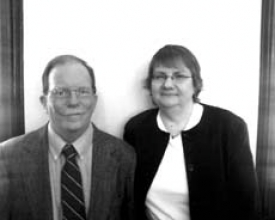
“Rescued At Sea: Who is in Your Boat?“
By Rev. Almon Bartholomew
Scripture text: On that day, when evening came, He said to them, “Let us go over to the other side.” Leaving the crowd, they took Him along with them in the boat, just as He was; and other boats were with Him. And there arose a fierce gale of wind, and the waves were breaking over the boat so much that the boat was already filling up. Jesus Himself was in the stern, asleep on the cushion; and they woke Him and said to Him, “Teacher, do You not care that we are perishing?” And He got up and rebuked the wind and said to the sea, “Hush, be still.” And the wind died down and it became perfectly calm. And He said to them, “Why are you afraid? Do you still have no faith?” They became very much afraid and said to one another, “Who then is this, that even the wind and the sea obey Him?” (Mark 4: 35-41 NKJV)
We don’t want you to miss the boat as you listen to today’s message. There is something in it for every age.
Prior to the tempest at sea Jesus had been teaching using familiar parables. Parables are earthly stories with heavenly meanings. The last recorded teaching of Jesus focused on the small mustard seed, planted and growing into a great tree. He likened it to the exercise of faith, small at first, but growing to work miracles.
That lesson came from the farm, common to all and easily understood. That lesson was soon tested at sea. Today farming is pretty much left to large co-ops and high tech methods and machines. In Jesus day just about everyone was a farmer. If you didn’t raise it, you didn’t eat it. Of course there were merchants, government jobs, religious leaders, and yes, fishermen. Even with these diverse occupations, most had family gardens as an at home source of food.
The parable Jesus taught was one of planting seed. Among the seeds he referred to was the mustard seed. It was tiny, but, when it was sown it grew larger than any other of the herbs. The growth was so great it became a mustard tree. In later reference this seed is likened to faith. Faith is like this seed. Although it may be small at the beginning, it will, if planted, become a powerful factor in life. I remember when in early spring a green house and flower shop owner in our home town. He said “It takes a lot of faith to see the lilies and other flowers grow up healthy and on time. Without those Easter lilies I would be out of business”.
What does this seed business and faith have to do with fishermen? The answer is, a lot. Lox and bagel combine the product of the sea and the product of the seed. At the end of a long day of teaching about seed planting, Jesus said, “Let us go over to the other side of the Sea of Galilee.” This request was given to experienced fishermen. They had braved many storms at sea. I don’t doubt but what they saw the signs of an impending storm. It was not wise to put out from shore. Nonetheless, at Jesus command, they set sail. That took some faith. That faith was sorely tested midway of the journey.
The storm they saw forming hit them with a vengeance. They were in utter peril, as were other little boats carrying Jesus followers which were alongside them. They had begun to take on water. Where was Jesus? He was in the boat, but he was sleeping, his head resting on a pillow. Some master! He got them into this mess and he is asleep! I wouldn’t be sleeping in a boat bobbing like a cork on a raging sea. When Joyce and I pastored in New Hampshire, we drove along the Shore of Newcastle Island. We watched a freighter rising on the crest of billowing waves only to disappear in the slough, out of sight. It was awesome. I can only imagine what these disciples felt when they awakened Jesus from sleep and said to him, “We are all about to drown out here! Don’t you care?” Jesus was not very popular at that moment. They were driven by fear alone. I also hear anger in their voices.
Jesus arose and rebuked the tempest. With his command “Peace, be still!” the waters were calmed, the wind subsided to a gentle whisper, the lightning retreated into the heavens and the thunder didn’t mumble a word. Then, I’m sure with understanding he asked, “Why were you so afraid? Had you not heard my message on faith? As long as I am with you in your boat everything is going to be all right!” When all of this happened they were really shook up and exclaimed, “Who is this that speaks and the winds and the waves obey him?”
I recall well when I was a young boy when my father took me and my two older brothers out fishing at nighttime in the narrows of Lake Champlain. A terrible storm came up. We were nearly swamped. I can still see the grim determination on my father’s face as the lightning flashed. He was pulling with all of his might on the oars of that old wooden rowboat. He was going to get his boys home safe that night. And he did! We would never have made it without my father in the boat! Dad was just as determined that his four sons and four daughters would know the Lord Jesus Christ as their personal Savior and weather the storms of life, arriving safely on Heaven’s shore.
Storms in life are inevitable. Sometimes they come with warning and sometimes they come on the scene as a complete surprise. As we sail across the sea of life, who is with us in our boat? In our younger years it was always good to have an older experienced sailor with us. But even then, that would not be sufficient had not the Lord been with us. And surely, now in our senior years we need the Lord in our boat. I am sure you can look back across your life span and recall divine intervention in your lives when tempests beat upon your frail ship.
It was July 12, 1944, more than seventy years ago, our home burnt to the ground and we lost everything. Dad had no insurance. Yet out of that unintended move, the circumstances of my life changed dramatically. That stormy experience brought me into a vital relationship with the Lord. Aside from that and a divine call to the ministry I would not be here today. Jesus came on board my boat December 18th, 1944 and made my life altogether different. He became the pilot on my ship of life.
Storms may come from different directions. It can be the loss of a parent, a child, a brother or sister. It can be a catastrophic illness. It can be a broken relationship. It can be financial duress. It can be the onset of serious depression. It can be the loss of independent living. It may come in the glimmering light of a candle at the end of its wick. Beyond all of these, you may not be given 30 days notice that it is coming!
The apostle Peter, in both of his epistles, addresses the distress which may come to the servants of the Lord. In First Peter 4:12 he writes, “Beloved, do not think it strange concerning the fiery trial which is to try you, as though some strange thing happened to you.”
He also wrote: “Blessed be the God and Father of our Lord Jesus Christ, who according to His abundant mercy has begotten us again to a living hope through the resurrection of Jesus Christ from the dead, to an inheritance incorruptible and undefiled and that does not fade away, reserved in heaven for you, who are kept by the power of God through faith for salvation ready to be revealed in the last time. In this you greatly rejoice, though now for a little while, if need be, you have been grieved by various trials, that the genuineness of your faith, being much more precious than gold that perishes, though it is tested by fire, may be found to praise, honor, and glory at the revelation of Jesus Christ” (I Peter 1:3-7).
God’s purpose for your life and mine is being worked out even when we think it may have been aborted.
If anyone ever knew how important it was to have the Lord in the boat with him it was Noah. He lived in a day of extreme wickedness. God had visited him and instructed him to build a seagoing vessel in the middle of a desert. There would be no maiden voyage, no shakedown cruise, no classy launching with public fanfare. Not only did the Lord order him to build a boat, he gave the blueprint to him. Upon completion and divine command Noah would fill the vessel with two animals of every kind.
The plan did not materialize over night. The carpenter/boat builder also became a preacher. For some 120 years he preached judgment was coming. A flood would engulf the earth. The only safe place to be would be the inside of this monstrosity he was building. That boisterous sinful society mocked him out. He did not gain one convert! I wonder if Noah did not at times think he had gotten the wrong message. In all things, the sweat of his brow, the rejection of his congregation, the extended period of waiting; through it all he persevered.
Then the day came. God said “Get on board”. Noah did exactly that and the Lord pulled up the gang plank and shut the door. It began to rain. That was something that had never happened before. It rained forty days and it rained forty nights. It rained ‘til there wasn’t no land in sight. Noah knew who was on board with him. God was the captain and the navigator. He guided it safely to an arranged landing site. Noah knew who was on board with him.
You and I can be just as sure as to who is on board with us. Jesus said, “Lo, I am with you always, even unto the end of the age.” Friend, do you know who is on your boat? You can be sure as you ask Jesus to captain your vessel and navigate your way to heaven.
I love the words of the old hymn, “Jesus Savior Pilot Me”
“Jesus, Savior, pilot me over life’s tempestuous sea.
Unknown waves before me roll, hidden rocks and treacherous shoals.
Chart and compass come from thee: Jesus, Savior, pilot me.”
Time to pray: “Lord Jesus, Come on board my boat of life. Be the captain of my ship. I will trust in you at all times. Guide me all the way to heaven, In Jesus Holy Name, Amen.”
Old Gospel Chorus “Just to have a touch, Lord, from you; Helps me in the hard trials I go through. Dark may be the night, It brings a ray of if light, when I get a touch Lord, from you”. (author unknown)

The Reverend Al, and wife Joyce, Bartholomew






